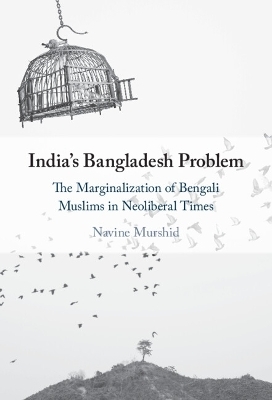
India's Bangladesh Problem
The Marginalization of Bengali Muslims in Neoliberal Times
Seiten
2023
Cambridge University Press (Verlag)
978-1-009-25942-2 (ISBN)
Cambridge University Press (Verlag)
978-1-009-25942-2 (ISBN)
Analyses the experience of Bengali Muslims on the India side of the India-Bangladesh border. Using the context of neoliberal policies, unequal bilateral relations, labour migration, contested citizenship and xenophobic government rhetoric, Murshid demonstrates that marginalization is based on a variety of historical, social and economic factors.
In recent years, Bengali Muslims in India have faced harassment and scapegoating as the trope of the illegal Bangladeshi has gained political currency. India's Bangladesh Problem explores the experience of Bengali Muslims on the Indian side of the India–Bangladesh border in the context of neoliberal policies, unequal bilateral relations, labor migration, contested citizenship, and increasingly xenophobic government rhetoric. Drawing on extensive research in the borderlands and hinterlands of both countries, Navine Murshid argues that ever-deepening neoliberal policies across the border have shaped how certain ethnic groups are valued and have reconfigured social hierarchies. She provides new insights into the strategic inclusion, exclusion, and invisibility that characterizes Bengali Muslims' lives, rendering them a group susceptible to manipulation by virtue of their ethnic kinship to the majority of Bangladeshis. In turn, Bengali Muslims simultaneously resist and utilize received neoliberal ideas to sustain their lives and livelihoods at a time when neoliberal development has largely bypassed them.
In recent years, Bengali Muslims in India have faced harassment and scapegoating as the trope of the illegal Bangladeshi has gained political currency. India's Bangladesh Problem explores the experience of Bengali Muslims on the Indian side of the India–Bangladesh border in the context of neoliberal policies, unequal bilateral relations, labor migration, contested citizenship, and increasingly xenophobic government rhetoric. Drawing on extensive research in the borderlands and hinterlands of both countries, Navine Murshid argues that ever-deepening neoliberal policies across the border have shaped how certain ethnic groups are valued and have reconfigured social hierarchies. She provides new insights into the strategic inclusion, exclusion, and invisibility that characterizes Bengali Muslims' lives, rendering them a group susceptible to manipulation by virtue of their ethnic kinship to the majority of Bangladeshis. In turn, Bengali Muslims simultaneously resist and utilize received neoliberal ideas to sustain their lives and livelihoods at a time when neoliberal development has largely bypassed them.
Navine Murshid is Associate Professor of Political Science at Colgate University. She is the author of The Politics of Refugees in South Asia: Identity, Resistance, Manipulation (Routledge, 2013).
Dedication; List of Figures; List of Tables; Acknowledgment; Introduction; 1. Neoliberalism and Identity-Based Hierarchy; 2. Borders as Sites of Strength and Vulnerability; 3. Assam and the Illegal Other; 4. Whatever Happened to Bengali Nationalism? The 'Appeased' Muslims of West Bengal; Conclusion; Select Bibliography; Appendices.
| Erscheinungsdatum | 27.03.2023 |
|---|---|
| Zusatzinfo | Worked examples or Exercises |
| Verlagsort | Cambridge |
| Sprache | englisch |
| Maße | 158 x 235 mm |
| Gewicht | 550 g |
| Themenwelt | Geisteswissenschaften ► Geschichte ► Regional- / Ländergeschichte |
| Sozialwissenschaften ► Politik / Verwaltung ► Europäische / Internationale Politik | |
| Sozialwissenschaften ► Politik / Verwaltung ► Politische Theorie | |
| ISBN-10 | 1-009-25942-3 / 1009259423 |
| ISBN-13 | 978-1-009-25942-2 / 9781009259422 |
| Zustand | Neuware |
| Haben Sie eine Frage zum Produkt? |
Mehr entdecken
aus dem Bereich
aus dem Bereich
Erinnerungen
Buch | Softcover (2024)
Pantheon (Verlag)
16,00 €
Universalgelehrter, Polarreisender, Entdecker
Buch | Hardcover (2024)
mareverlag
28,00 €


